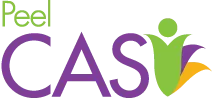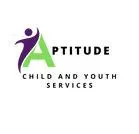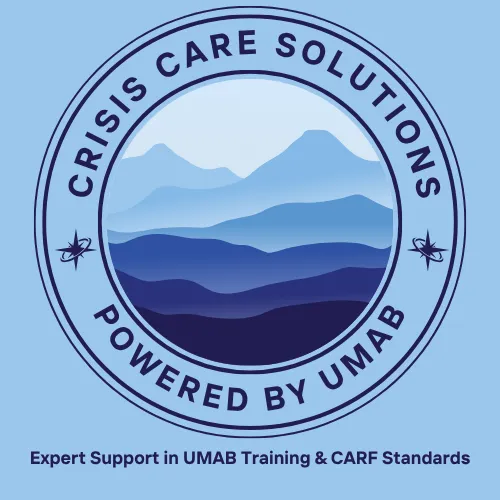Crisis Care Solutions: Powered by Hy'N'Hancement's U.MA.B. Program
CONTINUOUSLY DEVELOPING THE MOST EXTENSIVE CRISIS INTERVENTION MODEL...
We all know, supporting others can be difficult at times. We want to ensure a "least intrusive" and "least restrictive" approach is utilized with the focus on maintaining mutual Safety and Security.
What is U.M.A.B.?
Crisis Care Solutions is a proudly Canadian company, offering U.M.A.B. (Understanding and Managing Aggressive Behaviour) training. U.M.A.B. is a long standing Canadian created crisis intervention system for organizations and frontline support workers, equipping them to effectively handle challenging situations using the least intrusive and restrictive practices. The U.M.A.B. system has been utilized by a variety of child and youth & human service programs for over 25 years. Our goal is to promote emotional and environmental safety through informed planning and interventions.
For more details, please visit our UMAB Workshop Services Page
Our Lead Trainer:

Robert Schoemaker
Robert has been a Trainer for U.M.A.B. for over 25 years and has trained thousands of staff members and front line workers during this time. Robert is also an Individual and Family Therapist with more than 25 years of experience under the clinical supervision of a Registered Clinical Psychologist. In addition, he has extensive management experience in residential treatment and day treatment services for children.
Robert has 20 years of experience as an accreditation surveyor for Child & Youth Service Programs through CARF Canada (Commission for the Accreditation of Rehabilitation Facilities). Robert also has extensive expertise in program development, development of outcome measures, and program evaluation systems.
Passionate Expertise
Compassionate Approach
Diverse Background
Your Success, My Priority
Services

UMAB Workshops
This program is considered to be essential to the human service industry when dealing with aggressive and/or violent persons in need. It introduces the staff & caregivers to understanding the functionalities of a person's behaviour and how to identify vital signs of an impending crisis and manage it safely and effectively. If the situation becomes physical, training participants are taught the concepts of self-protection, disengagement skills, and the principles of using physical intervention on a continuum in various direct care service settings. This program is structured to incorporate both theoretical and experiential learning components. An understanding is provided of the legislative policies and procedures regarding the use of behaviour management intervention strategies required for frontline workers to be effective and successful in managing the behaviour of persons in need.

CARF Certification Consulting
Robert has been a CARF program surveyor for 20 years and has reviewed numerous Child & Youth programs and behavioural health programs. Consultation services are available for either initial accreditation as well as for reviewing annual changes to the standards for organizations currently accredited. Specifically, he is experienced with Non-Violent practices as a result of his long tenure as a UMAB trainer and practitioner.
Testimonials
"Peel Children's Aid Society began implementing UMAB within our residential group homes in 2001. Throughout the past 18 years, we have gradually integrated UMAB, Currently we teach UMAB across various areas within our agency including foster care, child protection and administrative/reception. It is our belief, that the philosophy and course material, effectively assist our staff and foster caregivers in dealing with the safety and security of our clients in a proactive and respectful way. Our agency always has as a focus proactive philosophy when interacting in potentially volatile situations. The contents within UMAB clearly have the same focus, which has enabled our staff, and foster caregivers to be highly successful."

E.S - Team Lead, CYW Support Program Peel CAS
"Over the past several years, I have worked with individuals that present with a variety of complex special needs with highly aggressive behaviours in both children/ youth and adult capacity. I’m very familiar with several forms of crisis management interventions. I can say without a doubt in my mind that UMAB is by far the most effective, whether it is the verbal de-escalation techniques as well as the physical techniques.
With that being said, when I created my agency supporting individuals with a variety of complex needs, we use UMAB training for my staff team. After the initial training, I became a UMAB trainer for my company and I continue to discover and learn each time from all the UMAB Trainers."

Alvin H. - Executive Director
Aptitude Services
FAQS
Is U.M.A.B. only a physical restraint training?
U.M.A.B. (Understanding and Managing Aggressive Behaviour) is not solely a restraint training program. While it does teach safe and appropriate physical intervention techniques, its primary focus is on prevention, de-escalation, and the safe management
of aggressive behaviour. Physical intervention skills, including restraint or containment, are considered a last resort and is only taught within the context of ensuring safety for all involved.
What is in U.M.A.B. Training?
U.M.A.B. Training consists of a combination of theoretical and practical components. Topics typically include understanding the causes of aggressive behaviour, prevention strategies, verbal and non-verbal de-escalation techniques, risk assessment, understanding your client, crisis intervention skills, and safe physical intervention methods. The training emphasizes the importance of empathy, communication, and professionalism when working with individuals exhibiting challenging behaviours.
How long has U.M.A.B. been around?
U.M.A.B. has been in use for several decades. It was developed in Canada by Hy'N'Hancment Consulting Inc. by Joseph Hyland in 1999 and has evolved over the years based on best practices and new research in behavioural management, mental health, and safety protocols. The program has a longstanding reputation for providing effective, evidence-informed training in a variety of settings.
What population is U.M.A.B. designed to service?
U.M.A.B. is designed to service professionals who work with individuals who may exhibit aggressive or challenging behaviours. This includes staff in schools, live-in programs, group homes, hospitals, mental health facilities, and other community support environments. The training is adaptable to children, youth, and adults, ensuring that it meets the needs of diverse populations and settings.
How long does a U.M.A.B. Certificate last for?
A U.M.A.B. Certificate is valid one year from the completion of the course.
How many days is the UMAB Training?
"Orientation Program" to UMAB is the initial course a person must take to obtain a UMAB certificate. The courses can be either two (no physical containments) or three (with physical containment) days in length.
“Continuing Education Program” is the recertification course that must be completed before the date of expiry on the person's current UMAB Certificate. The course would be either one day (if you completed the 2-day UMAB Orientation) or two days (if you completed the 3-day UMAB Orientation days in length.
How does an Agency arrange a U.M.A.B. Training?
Agencies can connect with us via email or phone.
How many days is the U.M.A.B. Training?
"Orientation Program" to U.M.A.B. is the initial course a person must take to obtain a U.M.A.B. certificate the courses can be either two (no physical containments) or three (with physical containment) days in length.
“Continuing Education Program” is the recertification course that must be completed before the date of expiry on the person's current U.M.A.B. Certificate. The course would be either one day (if you completed the 2-day U.M.A.B. Orientation) or two days (if you completed the 3-day U.M.A.B. Orientation days in length.
Is U.M.A.B. training available online?
Yes, many providers now offer U.M.A.B. training online—only for the theoretical component. The physical components must be taught in-person.
Can I get fully certified in UMAB through an online course?
No, Online courses only cover theory - we offer a certificate for just the theory component. The certificate will identify the training you received. Majority of oganizations complete the verbal training live-online and complete the practical based on legislation and orgnaizational Policy and Proceedures which may inclued self-protection, disengagement skills with physical containments (physical restraints) in-person.


